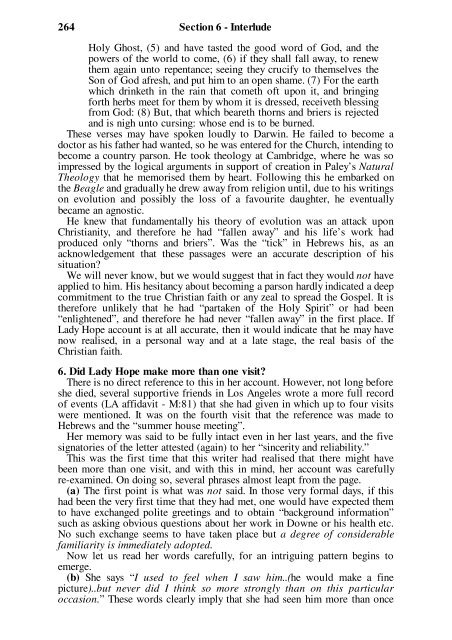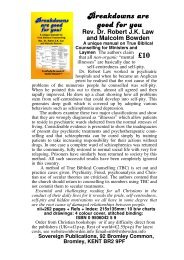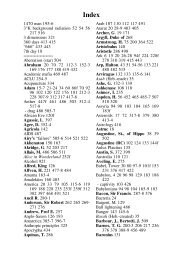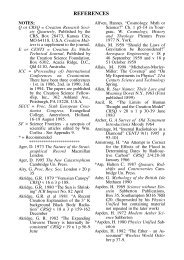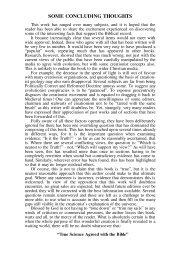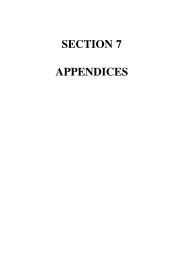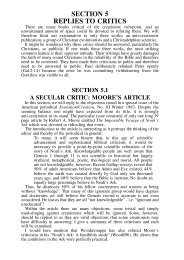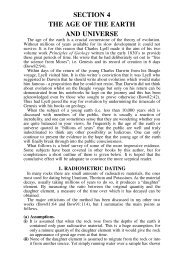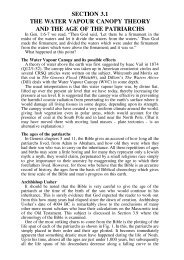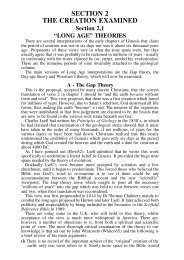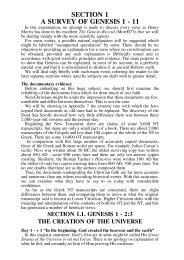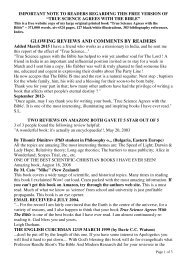TSAWTB Section 6 - Interlude - A Miscellany of Items
True Science Agrees with the Bible, Section 6 - Interlude - A Miscellany of Items (pp. 250-288)
True Science Agrees with the Bible, Section 6 - Interlude - A Miscellany of Items (pp. 250-288)
You also want an ePaper? Increase the reach of your titles
YUMPU automatically turns print PDFs into web optimized ePapers that Google loves.
264 <strong>Section</strong> 6 - <strong>Interlude</strong><br />
Holy Ghost, (5) and have tasted the good word <strong>of</strong> God, and the<br />
powers <strong>of</strong> the world to come, (6) if they shall fall away, to renew<br />
them again unto repentance; seeing they crucify to themselves the<br />
Son <strong>of</strong> God afresh, and put him to an open shame. (7) For the earth<br />
which drinketh in the rain that cometh <strong>of</strong>t upon it, and bringing<br />
forth herbs meet for them by whom it is dressed, receiveth blessing<br />
from God: (8) But, that which beareth thorns and briers is rejected<br />
and is nigh unto cursing: whose end is to be burned.<br />
These verses may have spoken loudly to Darwin. He failed to become a<br />
doctor as his father had wanted, so he was entered for the Church, intending to<br />
become a country parson. He took theology at Cambridge, where he was so<br />
impressed by the logical arguments in support <strong>of</strong> creation in Paley’s Natural<br />
Theology that he memorised them by heart. Following this he embarked on<br />
the Beagle and gradually he drew away from religion until, due to his writings<br />
on evolution and possibly the loss <strong>of</strong> a favourite daughter, he eventually<br />
became an agnostic.<br />
He knew that fundamentally his theory <strong>of</strong> evolution was an attack upon<br />
Christianity, and therefore he had “fallen away” and his life’s work had<br />
produced only “thorns and briers”. Was the “tick” in Hebrews his, as an<br />
acknowledgement that these passages were an accurate description <strong>of</strong> his<br />
situation?<br />
We will never know, but we would suggest that in fact they would not have<br />
applied to him. His hesitancy about becoming a parson hardly indicated a deep<br />
commitment to the true Christian faith or any zeal to spread the Gospel. It is<br />
therefore unlikely that he had “partaken <strong>of</strong> the Holy Spirit” or had been<br />
“enlightened”, and therefore he had never “fallen away” in the first place. If<br />
Lady Hope account is at all accurate, then it would indicate that he may have<br />
now realised, in a personal way and at a late stage, the real basis <strong>of</strong> the<br />
Christian faith.<br />
6. Did Lady Hope make more than one visit?<br />
There is no direct reference to this in her account. However, not long before<br />
she died, several supportive friends in Los Angeles wrote a more full record<br />
<strong>of</strong> events (LA affidavit - M:81) that she had given in which up to four visits<br />
were mentioned. It was on the fourth visit that the reference was made to<br />
Hebrews and the “summer house meeting”.<br />
Her memory was said to be fully intact even in her last years, and the five<br />
signatories <strong>of</strong> the letter attested (again) to her “sincerity and reliability.”<br />
This was the first time that this writer had realised that there might have<br />
been more than one visit, and with this in mind, her account was carefully<br />
re-examined. On doing so, several phrases almost leapt from the page.<br />
(a) The first point is what was not said. In those very formal days, if this<br />
had been the very first time that they had met, one would have expected them<br />
to have exchanged polite greetings and to obtain “background information”<br />
such as asking obvious questions about her work in Downe or his health etc.<br />
No such exchange seems to have taken place but a degree <strong>of</strong> considerable<br />
familiarity is immediately adopted.<br />
Now let us read her words carefully, for an intriguing pattern begins to<br />
emerge.<br />
(b) She says “I used to feel when I saw him..(he would make a fine<br />
picture)..but never did I think so more strongly than on this particular<br />
occasion.” These words clearly imply that she had seen him more than once


